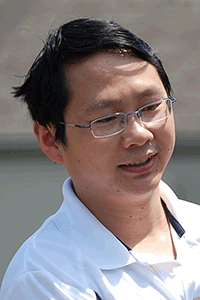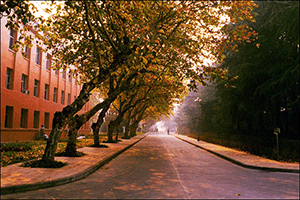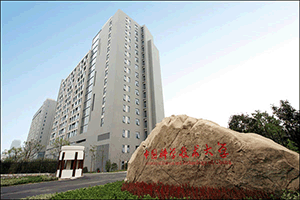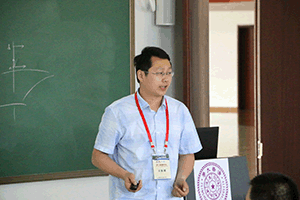
Professor Zuoqin Wang, School of Mathematical Sciences, University of Science and Technology of China
Professor Zuoqin Wang is Professor of Mathematics at the University of Science and Technology of China (USTC) in Hefei, China. Originally educated at this university, Zuoqin returned to China and USTC in 2013. He was recruited via the Chinese government’s 1000 Recruitment Programme for Young Talents after studying and working as an academic in the USA for ten years.
Zuoqin completed his bachelor’s and master’s degrees in pure mathematics at the USTC before moving to the USA in 2003 for his PhD at the Massachusetts Institute of Technology. In 2008 he was appointed J.J.Sylvester Assistant Professor of Mathematics at John Hopkins University, Baltimore, Maryland, working there until 2010. Zuoqin then moved to the University of Michigan for another assistant professorship before returning to China in the summer of 2013.
Equally popular with students and colleagues, Zuoqin has received various fellowships and prizes including the Joel Dean Award for Excellence in Teaching (John Hopkins’s University, 2010).
Sarah Marten talked to Zuoqin on behalf of jobs.ac.uk about his career and the reasons behind his decision to return to China.
What does your present job involve?
My job as professor of mathematics involves a combination of teaching and research. I’ve been at the USTC for eighteen months and I’m teaching some completely new courses for the university. Each semester I teach one course, and I am currently teaching a course for graduate students in a specialist field known as semi-classical and micro-local analysis.
I only teach for about four hours a week at present, but the weekly preparation for this high-level graduate course takes me a further 20 hours. My students are mostly graduates and some of them already have post-doctoral qualifications. So it’s vital that I prepare the course really thoroughly.

University of Science and Technology of China
Although there are existing text books to accompany the course, I always like to write my own detailed course notes which then go on our web pages. My students really appreciate this extra support which also ensures that my students benefit from my understanding of these complex topics.
As well as teaching I dedicate at least the same amount of time each week (twenty hours) to my own research projects. I also enjoy having a number of PhD students to supervise, and part of this work involves running seminars for about three hours a week, where I often invite visiting speakers from both China and overseas.
Have you noticed any differences between the American and Chinese students?
The USTC is one of the best universities in China and has extremely motivated and dedicated students. And the students don’t have the same distractions here in Hefei that they might have in Beijing, for example, so they spend more time working! As I am often in my office late at night, it’s not unusual for students to come to see me at 11:30 pm to ask for advice about their work. This didn’t really happen in the USA.
What about the different academic systems in the USA and China?
I have found them quite different in that the American students have more opportunity to choose different maths courses if they wish. For example in the USA in the same class I can find students from very different departments such as engineering and economics. Here in China it is different – undergraduates from the same department are usually supposed to take the same group of courses, so that in most undergraduate classes we are teaching students from only one or two departments.
In America I was able to collaborate with a wide range of research staff. Such opportunities are more limited in China. However, I am fortunate in that I can maintain the links I made with different academics whilst working overseas and this makes a real difference to my work and research here. This enables me to introduce new and different ideas to China. And I was also very fortunate in being able to visit the Massachusetts Institute of Technology recently as a visiting professor, as I had worked there previously.

University of Science and Technology of China
I have found that the amount of money available for research funding in China is better than it was whilst I was in America. The Chinese government is very keen to fund academic research where possible.
What hours do you work and how do you achieve a work-life balance?
I usually start work between 8am and 9am and I’m very fortunate in that my journey from home to work takes only ten minutes. Late nights – anything from 10:30pm to 11:30pm – are part of my working pattern about four days a week.
However, because my flat is so near the university I usually finish work at about 6pm and spend a couple of hours with my wife and two young children. I am often back at my office by 8:30 pm ready to finish off the day’s work. I usually do some work at the weekends, but always make sure that I also have time with the family.
How did you find the settling-in process?
Everything has gone really smoothly! The USTC provided ideal on-campus accommodation for me and my family. One of the benefits of being recruited via the 1000 Talents Youth Program is the extra help you receive, which really helps you to settle in. They have even helped my wife to find a job at the university.
I have two young sons aged nine and four, and the eldest has found the transition a little more difficult. This is mostly because children in China have a lot more homework than they do in America!

Professor Zuoqin Wang
The administrative staff at USTC have also been really helpful and I get excellent support from our team of secretaries.
What does the 1000 Talents Recruitment Program involve?
In 2008 the Chinese government developed the 1000 Talents Recruitment Program to encourage academics with outstanding performance to apply for university posts in China. The aim of the scheme is to improve the academic standards in China. Because I was under 40, I was able to apply via the Program for Young Talents.
I have benefitted from this program in so many different ways. Firstly there are financial incentives such as a highly competitive salary and a generous research start-up fund. So I haven’t had any of the usual worries about research funding that academics often face. As well as this the program helps provide visas for your family if needed and assistance with finding suitable schools, including places at an international school if desired. They can even help you to buy your own apartment.
What do you enjoy about your job?
I love working with the PhD students as they are highly-motivated and they bring so many new ideas. But I enjoy all aspects of my job including teaching and research.
My experience in America is really helping in this job. I can use ideas that I developed during my time there as well as good practice from the American system to inform my work here. For examples regular seminars are widely used in America and so we have decided to develop this style of teaching in the maths department at USTC.
Have you got any advice for academics wishing to work in China?
- Investigate schemes like the 1000 Talents Programme – these give your career an excellent boost and are very worthwhile
- Chinese universities are looking for candidates with a strong research background – you’ll need demonstrable evidence of this backed up by published research in high-quality journals
- Get involved in committees and research groups as much as possible as this will enhance your application to a Chinese university.




Sir i have done Bs mathematics how can i do m.s from chaina
I did a master of science in Mathematics. How can I do a phd in Mathematics at your University?